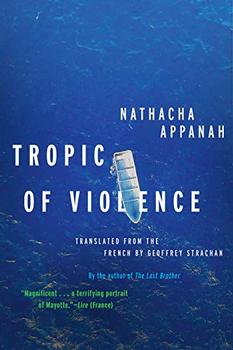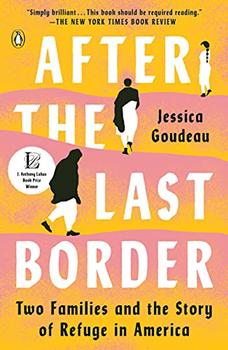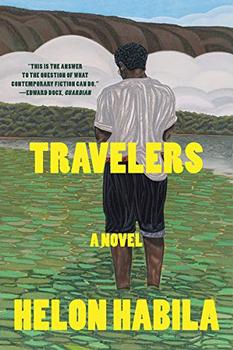Summary | Excerpt | Reviews | Beyond the book | Read-Alikes | Genres & Themes | Author Bio

 Book Reviewed by:
Book Reviewed by:
Callum McLaughlin
Buy This Book
Marie is a nurse working in Mayotte, a cluster of French territory islands in the Indian Ocean. When a young refugee from nearby Comoros abandons her baby, Marie takes him in and raises him as her own. Thirteen years later, Moïse finds himself orphaned for a second time when Marie dies abruptly, forcing him onto the dangerous streets that are ruled by gangs of fellow wayward children who have fallen through the cracks of this fractured society.
Moïse is a clever choice of central character to base this particular story around. His faltering sense of identity means he is uniquely positioned to expose just how pervasive the poverty and violence sweeping across Mayotte have become. Though he was raised by a white local, his black skin serves as a clear indicator of his refugee beginnings, and the residents of Mayotte act with increasing hostility towards perceived outsiders like him who they feel are taking over their land. Despite living in Mayotte his whole life, he is still made to feel like an outcast, and he finds himself pushed to the fringes of society as soon as Marie, the one tangible thing anchoring him to the region, is gone.
If Moïse is presented as our sympathetic hero, Bruce, the much-feared leader of a local gang, is in many ways his opposite. His point-of-view chapters reveal an erratic and desperate need to exert control, but at just 17 years old, with a nickname inspired by the alter ego of Batman, it is impossible for the reader to forget his youth and naivety. Though nothing can excuse the cruelty of his actions, Nathacha Appanah presses home that Bruce too is just a child corrupted by a flawed system, asking us to consider where we draw the line between victim and villain.
Other narrators serve to show us how well-meaning yet misguided efforts to help Mayotte's children can be: Marie loves Moïse, but she is not without her own prejudices; aid worker Stéphane's actions cause more harm than good; and police officer Olivier's team is stretched well beyond its means. It's clear that insufficient attention from mainland France is playing a key role in Mayotte's self-destructive way of life; locals and refugees feel equally betrayed by a distinct lack of support from a country powerful and wealthy enough to do more. Saying much with few words, Appanah reminds us that the refugee crisis often hits closer to home than many countries and governments are willing to admit. She also shines a light on what can happen when communities are left to struggle beneath the weight of this problem unaided. This strikes at the hypocrisy of colonialism, where dominant nations are too often willing to reap the rewards of extended landmass and increased resources without offering equivalent compensation and assistance in return.
In an interesting stylistic twist, a couple of our point-of-view characters are in fact deceased, narrating their stories from what appears to be some kind of purgatory. This could easily have tipped the book into twee territory, but Appanah strikes a careful balance. She uses these sections to capture an air of quiet magic befitting the region's strong cultural belief in spirits and djinns, without lessening the impact of the raw realism established throughout the rest of the novel.
The prose itself is initially unassuming, but closer inspection reveals a subtle skill that underpins the novel's construction. Appanah juxtaposes the depravity of the overflowing slums with the beauty of their natural surroundings, and she is able to reflect the violence and suffering endured by Moïse without indulging in gratuity. With five point-of-view characters in all, it also would have been easy for the multiple perspectives to bleed together, but each narrative voice stands out distinctly. This clear individuality of character is a testament to Geoffrey Strachan's sensitive translation from the original French, and functions as a timely reminder that each person affected by mass global displacement is a human being with their own story to tell.
With such upsetting subject matter and big moral questions at the heart of the story, in some respects, Tropic of Violence is the kind of novel that could be hard to describe as "enjoyable." But with a singular atmosphere and a protagonist that is easy to root for, Appanah has crafted a reading experience that is as captivating as it is thematically provocative.
![]() This review
first ran in the May 20, 2020
issue of BookBrowse Recommends.
This review
first ran in the May 20, 2020
issue of BookBrowse Recommends.

If you liked Tropic of Violence, try these:

by Jessica Goudeau
Published 2021
The story of two refugee families and their hope and resilience as they fight to survive and belong in America.

by Helon Habila
Published 2020
A startlingly imaginative exploration of the African diaspora in Europe, by one of our most acclaimed international writers.





The House on Biscayne Bay
by Chanel Cleeton
As death stalks a gothic mansion in Miami, the lives of two women intertwine as the past and present collide.

The Flower Sisters
by Michelle Collins Anderson
From the new Fannie Flagg of the Ozarks, a richly-woven story of family, forgiveness, and reinvention.

The Funeral Cryer by Wenyan Lu
Debut novelist Wenyan Lu brings us this witty yet profound story about one woman's midlife reawakening in contemporary rural China.
Your guide toexceptional books
BookBrowse seeks out and recommends the best in contemporary fiction and nonfiction—books that not only engage and entertain but also deepen our understanding of ourselves and the world around us.